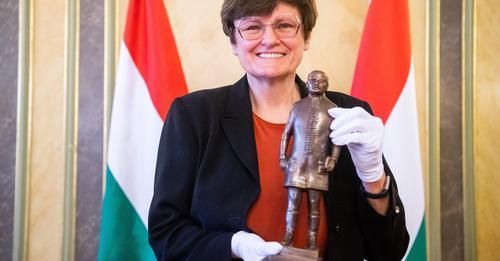mRNA Pioneer Karikó Mentioned Among Favorites in Two Nobel Prize Categories
Katalin Karikó, whose work was pivotal in creating the Pfizer-BioNTech coronavirus vaccine, has been mentioned for some time now as a possible Nobel Prize winner. However, she may have a chance to win not only in one category but two: chemistry and medicine (or physiology and medicine, to be more precise).
While Karikó is a molecular biologist and biochemist, her work’s goal with the mRNA technology has always been to use the findings in medicine in order to cure people. For this reason, a future win would make sense in both categories.
Biochemist Katalin Karikó is responsible for creating the groundbreaking technology that became the basis of all available mRNA-based COVID-19 vaccines. Through her achievement, she provided a major contribution in saving the lives of millions and slowing the spread of the coronavirus.
The signs are very good in the medical category. Karikó and Drew Weissman won the Rosenstiel Prize in February and the Horwitz Prize in August. Both prizes are seen in the scientific world as the precursor to the Nobel Prize, especially in medicine. Out of the 93 Rosenstiel winners, 36 have gone on to win Nobel Prizes, and the Horwitz Prize has been followed by a predominantly medical Nobel Prize, with a small proportion of Nobel Prizes in chemistry. Karikó and Weissman recently also won the Breakthrough Prize that many are calling the ‘Oscars of science,’ and among the former winners, we can find the name of Stephen Hawking.
Katalin Karikó, whose work was pivotal in creating the Pfizer-BioNTech coronavirus vaccine, has been mentioned for some time now as a possible Nobel Prize winner. However, she may have a chance to win not only in one category but two: chemistry and medicine (or physiology and medicine, to be more precise).
While Karikó is a molecular biologist and biochemist, her work’s goal with the mRNA technology has always been to use the findings in medicine in order to cure people. For this reason, a future win would make sense in both categories.
Biochemist Katalin Karikó is responsible for creating the groundbreaking technology that became the basis of all available mRNA-based COVID-19 vaccines. Through her achievement, she provided a major contribution in saving the lives of millions and slowing the spread of the coronavirus.
The signs are very good in the medical category. Karikó and Drew Weissman won the Rosenstiel Prize in February and the Horwitz Prize in August. Both prizes are seen in the scientific world as the precursor to the Nobel Prize, especially in medicine. Out of the 93 Rosenstiel winners, 36 have gone on to win Nobel Prizes, and the Horwitz Prize has been followed by a predominantly medical Nobel Prize, with a small proportion of Nobel Prizes in chemistry. Karikó and Weissman recently also won the Breakthrough Prize that many are calling the ‘Oscars of science,’ and among the former winners, we can find the name of Stephen Hawking.
mRNA Pioneer Karikó Mentioned Among Favorites in Two Nobel Prize Categories
Katalin Karikó, whose work was pivotal in creating the Pfizer-BioNTech coronavirus vaccine, has been mentioned for some time now as a possible Nobel Prize winner. However, she may have a chance to win not only in one category but two: chemistry and medicine (or physiology and medicine, to be more precise).
While Karikó is a molecular biologist and biochemist, her work’s goal with the mRNA technology has always been to use the findings in medicine in order to cure people. For this reason, a future win would make sense in both categories.
Biochemist Katalin Karikó is responsible for creating the groundbreaking technology that became the basis of all available mRNA-based COVID-19 vaccines. Through her achievement, she provided a major contribution in saving the lives of millions and slowing the spread of the coronavirus.
The signs are very good in the medical category. Karikó and Drew Weissman won the Rosenstiel Prize in February and the Horwitz Prize in August. Both prizes are seen in the scientific world as the precursor to the Nobel Prize, especially in medicine. Out of the 93 Rosenstiel winners, 36 have gone on to win Nobel Prizes, and the Horwitz Prize has been followed by a predominantly medical Nobel Prize, with a small proportion of Nobel Prizes in chemistry. Karikó and Weissman recently also won the Breakthrough Prize that many are calling the ‘Oscars of science,’ and among the former winners, we can find the name of Stephen Hawking.
0 Reacties
0 aandelen
0 voorbeeld



